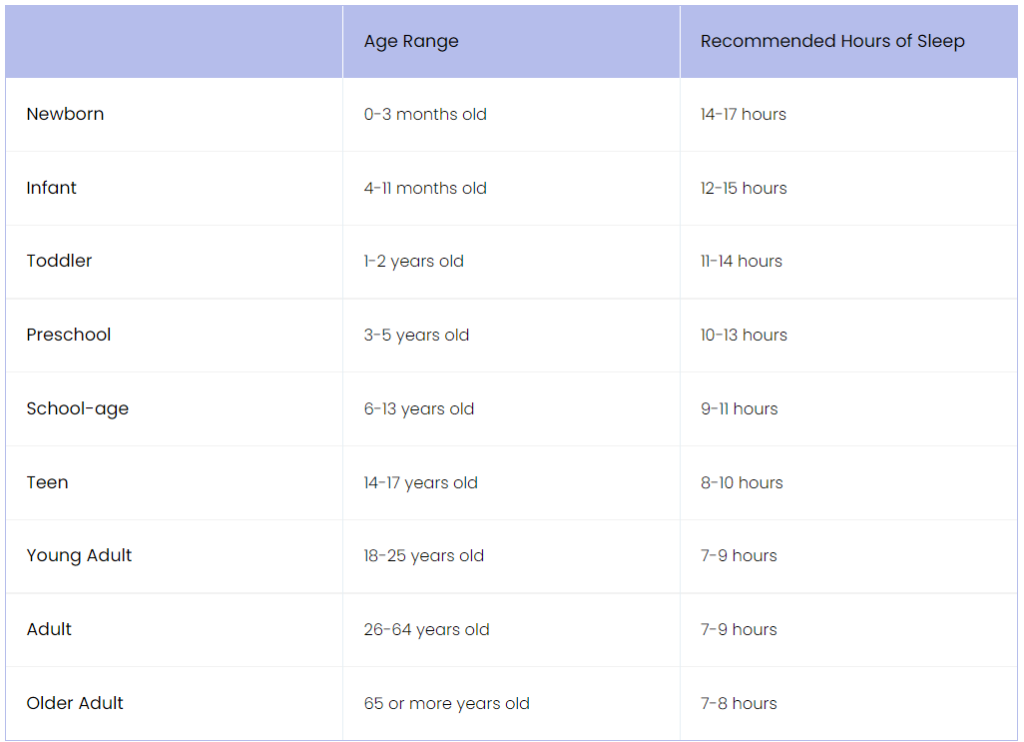Scientific research clearly shows that sleep is essential at any age. Sleep nourishes the mind, restores the body, and strengthens virtually every system in the body. But how much sleep do we need to reap these benefits? In this article, we will let you know ideal sleeping time.
National Sleep Foundation1 guidelines state that healthy adults need 7 to 9 sleep per night. Babies, toddlers and teens need even more sleep to support growth and development. People over 65 should also benefit from 7-8 hours a night.
The first step is to know the overall recommendations for how much sleep you need. Next, it’s essential to consider your unique needs based on factors like your activity level and overall health. Finally, healthy sleep tips must be practical to ensure you get the recommended night’s sleep.
Table of Contents
Recommended sleep times by age group
The recommended sleeping times are not spoken into nine age groups. Within each group, the guidelines represent a recommended range of nightly sleep duration for healthy people. In some cases, depending on the individual’s situation, getting about an hour of sleep out of the available range may be acceptable.

How much sleep do you need
These guidelines serve as a general rule of thumb for determining how much sleep children and adults need, recognizing that the ideal amount of sleep may vary from person to person.
For this reason, the guidelines give a range of hours for each age group. The recommendations also recognize that, for some people with exceptional circumstances, there is leeway on either side of the content for an “acceptable” amount of sleep, albeit still less than optimal.
To decide how much sleep you need, you need to consider your general health, daily activities and usual sleep patterns. Here are some questions to help you assess your individual sleep needs:
Are you fit, healthy and happy after seven hours of sleep? Or have you noticed that you need more rest to start at full speed?
Do you have health problems at the same time? Are you at increased risk for disease?
Do you have a high daily energy consumption? Do you exercise frequently or work in a labor-intensive job?
Do your daily activities require attention to carry them out safely? Do you drive and use heavy machinery every day? Do these activities sometimes make you sleepy?
Do you suffer from sleep disturbances, or have you ever had one in the past?
Do you depend on caffeine to get through the day? Do you rely on caffeine to become you through the day?
When you have an open timetable, do you sleep more than you would on a typical workday?
Start with the recommendations above, then use your answers to these questions to focus on getting optimal sleep.
Tips to improve your night routine
A good night’s sleep rejuvenates you mentally and physically. It ends a long day and gets you off to a great start the next morning. At night, as you drift off into the realm of dreams, your body focuses all of its energies on healing and preparing itself for the next day. The better you rest, the healthier you will feel.
A nightly routine will help you get into the right mindset and sleep state. That encourages you to slow down and prepare for the rest you and your body need. Here are some tips to improve your nightly routine and ensure a good night’s sleep.
Prep Your Sleeping Space
How well you sleep depends on where you go to bed. Going to bed is difficult in an uncomfortable or distracting environment since your mind is kept busy and restless. You are making your bedroom a sleep sanctuary that eliminates anything interfering with your sleep. Prepare your bedroom before bed or during the day to make it a relaxing, lulling area. Several ways to prepare your bedroom include adding calming smells, dimmer lights, and unplugging electronics.
Set a Wind Down Time
Even for adults, having a regular bedtime has many advantages. By making sure you get enough sleep, you can maximize your vitality, physical health, and mental wellness. Setting a wind-down period before going to bed, in addition to a regular bedtime, guarantees you a good night’s sleep. Many people fill a lot of time in bed, awake in both the eyes and the mind. Your mind is calmed during a wind-down period, enabling you to fall asleep and feel relaxed. It guarantees that once your eyes are closed, you will drift off. Set a timer for an hour before your scheduled bedtime to begin slowing down.
Engage in Relaxing Activities
Spending time relaxing during wind-down time helps you to relax and get ready for sleep. Your mind and body will naturally slow down if you practise meditation, drink sleepy time tea, colour, or listen to ASMR. Additionally, it helps you feel secure and at ease, making sleeping more straightforward without being kept awake by mental worries. Numerous people find certain activities tranquil and soothing. Finding a method that works for you guarantees you will experience the ideal sleepiness for a restful night’s sleep.
Create a To-Do List for Tomorrow
Sometimes your mind struggles to comply, even after you’ve closed your eyes for a while. Anxiety is one of the main reasons. Your anxious thoughts might keep you up at night, including worrying about the future and mentally repeating and reenacting incidents. Making a to-do list for the next day eases worries and gives you the confidence to face tomorrow. You can sleep more quickly once your fears are thankful.
You’ll be ready to face the following day with a fresh outlook if you have a decent night’s sleep. You’ll be on the best edge of mind to sleep if you improve your evening routine. It ensures that you drift off to sleep as soon as your head strikes the pillow.
Also read : Fall Asleep Easily, Naturally
Also read: How To Look Beautiful Naturally Everyday







